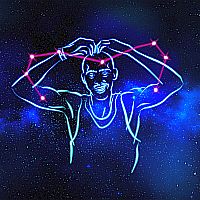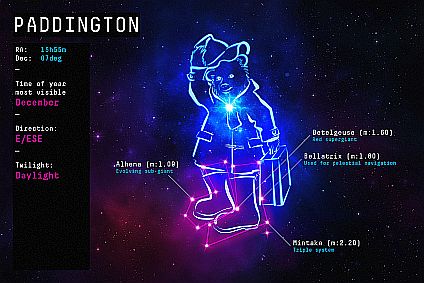
|
|
Star LoreNew Constellations?An interesting proposal made in 2017 |
|



In 2017, a study initiated by the Big Bang Fair found that 72% of young people between the ages of 7
and 19 in the United Kingdom had never looked for constellations in the sky and that 29% of them wouldn’t be able to recognize a single classical
constellation when shown them.
 In an effort to increase young people’s interest in the stars, Big Bang Fair partnered with astronomers at University of Birmingham.  Together, they created Look Up To The Stars: a new set of constellations representing icons from sport, entertainment, science and activism that children are inspired by today. |
 Eight "New Constellations"; Source: India Times
Eight "New Constellations"; Source: India Times
|

| Here are the eight constellations suggested by the University of Birmingham astronomers (in alphabetical order): |


Attenborough
 A whale represents Sir David Attenborough, an English Naturalist who is famous for his documentaries about plant and animal life on Earth. His most popular publications were the TV series Life on Earth and The Life Collection, a 24-disc DVD box set of eight titles from his 'Life' series.  The "constellation" stretches across Ursa Minor and Ursa Major.  The designers pointed out the stars Alioth (ε UMa) and Kochab (β UMi). |

|

 |
Bolt
 Jamaican sprinter Usain Bolt depicted in his "Lightning Bolt Celebration" pose.  Usain Bolt is eight-time Olympic gold medalist and eleven-time World Champion. At the 2008 Summer Olympics in Beijing, he won both the 100 meters and 200 meters sprint competitions in world record times.  The "constellation" stretches from Orion (ο1 Ori) to Taurus (88 Tau).  Most notable stars are Aldebaran (α Tau) and Ain (ε Tau). |

Malara
 A book represents Malala Yousafzai, a Pakistani activist for female education.  In 2012, on her way home from school, she was severely wounded in an assassination attempt by the Taliban who tried to ban girls from schools. Following her recovery, Malala became a prominent activist for the right to education.  In 2014, at age 17, she became the youngest-ever Nobel Peace Prize laureate.  The "constellation" includes the north star Polaris (α UMi) and the northern stars of the constellation Cepheus, Errai (γ Cep) and Alfirk (β Cep). |

|


 |
Mobot
 Mobot is a famous pose by British long distance runner sir Mo Farah. The pose represents the letter M.  Mo Farah won the 5,000 and 10,000 meter races in consecutive Olympic Games (2012 and 2016) and consecutive World Championships (2013 and 2015)  The "constellation" is located around the constellation Corona Borealis.  Most prominent stars are Alphecca (α CrB) and Nusakan (β CrB).  |

Paddington
 The Paddington Bear is the star of over twenty children's books written by British author Michael Bond and illustrated by Peggy Fortnum and other artists.  The "constellation" depicting the bear's boots stretches from the southern part of Gemini to the northern parts of Orion, including Alhena (γ Gem), Mintaka (δ Ori), Bellatrix (γ Ori) and Betelgeuse (α Ori). |

|

 |
Peake
 The outline of a US Space Shuttle is meant to pay tribute to British astronaut Tim Peake. In 2012, Peake became the second British citizen in space and the first British ESA astronaut on board of the International Space Station.  Peake actually never flew the Space Shuttle. His space flight with the Russian Soyuz TMA-19M took place a year after the retirement of the Shuttle fleet.  The "constellation" is created using stars of the constellation Leo.  Most prominent stars are Regulus (α Leo), Denebola (β Leo) and Algieba (γ Leo). |

Potter
 A group of stars in the shape of a pair of spectacles has been interpreted as Harry Potter's glasses, commemorating British writer J. K. Rowling and the Harry Potter book series, the best-selling book series in history.  The "constellation" consists of stars from the constellations Serpens and Boötes with Izar (ε Boo) being the most prominent star. |

|

 |
Serena
 Six stars in the shape of a tennis racket pay homage to US professional tennis player Serena Williams.  Since 1999, Serena Williams has won a total of 39 Grand Slam titles (23 single, 14 women's doubles, and two mixed doubles).  The "constellation" is created using Kochab (β UMi)) and Pherkad (γ UMi), the southern stars of the constellation UrsaMinor and stars from the constellation Draco, most notably Thuban (α Dra). |

|
Sources: globalcitizen.org,
osr.org,
Stargazing by The Big Bang
There is a lot that could be said in favor or against this idea.
The creators of the proposal did not supply a complete list of stars for each "constellation", but they published a set of images with basic descriptions (see below).
|



 Attenborough |

 Bolt |


 Malara |

 Mobot |


 Paddington |

 Peake |


 Potter |

 Serena |


|
Back to Star Lore |
Back to Mythology |
Back to Space Page |
Back to English |
 Back to Start Page |